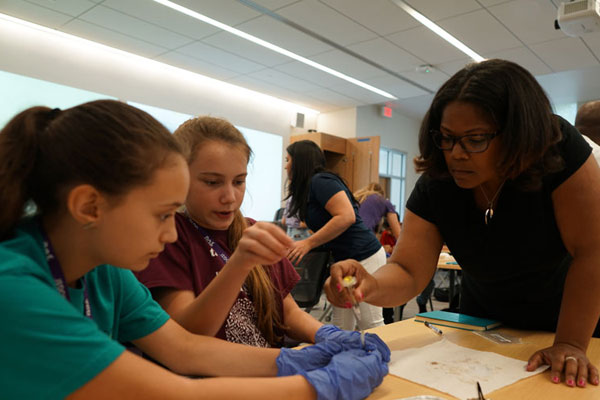
The inaugural class of 60 TCU and UNTHSC School of Medicine students aren’t expected to arrive until summer 2019, but medical school was in full swing in June with 27 eager scholars spending their days on the TCU and UNT Health Science Center campuses. Students logged time in the anatomy lab, learned emergency medical procedures and participated in dissection activities – responses overheard ranged from “so cool!” to “so gross!” And that’s exactly what the designers of the program were hoping for.
Junior Medical School is a week-long program that allows rising Fort Worth ISD eighth-grade students to discover medicine, empower personal achievement and develop a network of peers and mentors through hands-on medical activities. The program was made possible by the support of local physician volunteers and the JPMorgan Chase Foundation’s workforce development grant through UNTHSC.
“Our goal was to create an environment that excites students and inspires them to explore the possibilities of higher education through activities that many won’t have the opportunity to experience until they reach college,” said Associate Dean of Admissions and Student Diversity Tara Cunningham, Ed.D.
The students were recommended by their respective principals to apply for the program and collectively attend J.P. Elder Middle School, Young Men’s Leadership Academy and Young Women’s Leadership Academy. The camp simulated a college experience, with nearly all activities taking place on the two university campuses. Participants received acceptance letters to the program in May, as well as their own set of scrubs to keep, presented during closing ceremonies.
Students spent the week learning from local physicians who volunteered their time to teach classes and lead lab activities. Junior Medical School campers dissected an animal eye, practiced their suturing skills with the aid of simulated skin pads, learned the proper way to scrub in for a procedure and regularly engaged with their college-student counselors.
“These students learned a lot this week, but I think I may have learned even more just by watching them and seeing their excitement,” said Christine Pho, “Serving as their counselor this week is something that will impact me for years to come.”
Students were also able to get a behind-the-scenes hospital experience, thanks to Texas Health Resources. One field trip was spent suiting up and scrubbing in to enter an operating room at Texas Health Clearfork so students could try their hand at a simulated knee replacement. Staff volunteered to assist the students, giving them a tour of the tools used in orthopedic surgery.
At Texas Health Harris Methodist, students spent time in the Amon G. Carter Medical Simulation Training Center, learning from emergency medicine residents from John Peter Smith Hospital about how they react in real-life trauma situations.
“They got to experience technology they normally wouldn’t get to see at this point in their education,” said Adam Jennings, director of medical simulation at John Peter Smith Hospital. “We conducted an ultrasound, they got to draw fake medications in a controlled environment, did chest compressions – they would never get to do any of this in a real-life situation, but the simulation lab makes that experience possible.”
One student, Diego Montalvo, was especially impacted by the simulation center. “To see an emergency room in action is surprising. I didn’t think you’d need that many people to save a person’s life.”
The week concluded with a graduation ceremony held on TCU’s campus, with family and friends of the participating students in attendance. The School of Medicine plans to continue to connect with these students throughout their middle education, exposing them to career opportunities in the science and medical fields and equipping them for their future endeavors.
“We may not have our own students yet, but that doesn’t mean we can’t start engaging with the community and giving back now,” Cunningham said. “Investing in local students is a priority for our school and we want to give back to the community that continues to support us in so many ways.”
Read the story as reported by NBCDFW.

 In addition to the rigors of medical school, studying for board exams and applying for residency programs, medical students are strapped with an additional worry: growing student debt.
In addition to the rigors of medical school, studying for board exams and applying for residency programs, medical students are strapped with an additional worry: growing student debt.